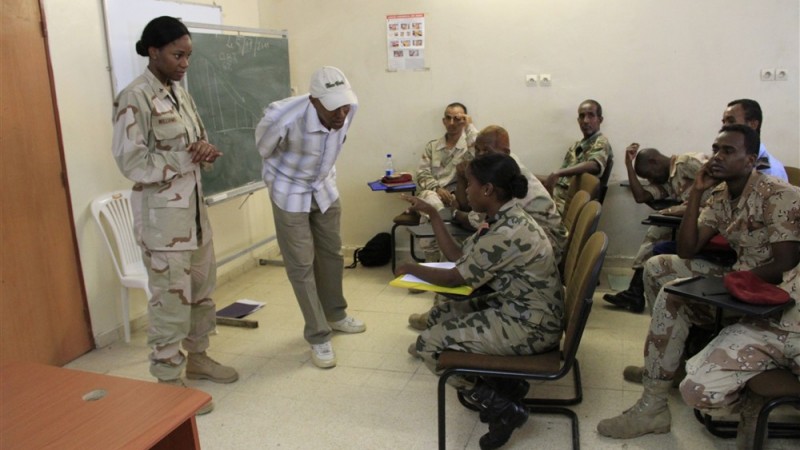Djibouti, a small state bordering Africa and the Arabian Peninsula, is playing a major role in the West’s fight against jihadism. A haven for both foreign military bases and refugees — especially from Yemen — the strategic importance of the country situated in the Horn of Africa continues to grow.
Djibouti is a land of paradoxes. Bordered by Eritrea, Ethiopia and Somalia, the economically depressed state is one of Africa's smallest, yet it is also one of the most coveted by larger powers. The country has been ruled by President Ismael Omar Guelleh since 1999 and although the government’s official line has been largely pro-American, the broader populace has increasingly distanced itself from this stance.
In fact, Djiboutians are growing more and more skeptical of the fight against jihadism in the form of US-led assaults on both the Al-Qaeda terror group once controlled by Osama bin Laden, and ISIS, a growing radical fighting force that has conquered large swathes of Iraq and Syria.
As these conflicts drag on with no end in sight, Djiboutians fear that violence might flourish on their soil as they have in neighbouring Yemen. But it is from the fight against “terrorism” that a country with very few natural resources draws its lifeblood.
Djibouti, a hub in the fight against jihadism
As a bridge between Africa and the Middle East, great powers are jostling to get their troops and equipment into Djibouti.
While France’s presence in the country is by far the most longstanding — Djibouti gained independence from France in 1977 but has remained close to Paris ever since — the September 11 attacks put Djibouti firmly on the United States’ military radar.
In 2014, the US, which has maintained a military presence in Djibouti since 2002, renewed the lease on its military installation in the country for another ten years at a cost of $40 million per year.
The Pentagon now plans to spend more than $1 billion over the next 25 years to enlarge the US base there. As President Obama explained when President Gulleh visited the White House last year:
There’s a significant presence of soldiers from Djibouti who are participating in the multinational force that has been able to push back [Al-Quaeda-affiliated] Al-Shabab’s control over large portions of Somalia.
Japan and Germany followed the lead of France and the USA by building military facilities in Djibouti and now it is China’s turn to stake a claim. While Beijing might be motivated primarily by economic concerns — its economic influence in the region has been growing exponentially in recent years — it is also alarmed by the growing jihadist threat in the Middle East. With ISIS jihadists controlling important petroleum resources in Syria and Iraq, Xi Jinping’s government will be hoping to secure its oil supply in the broader region.
Djibouti, a refugee safe haven
While the foreign military presence in Djibouti brings Omar Guelleh’s government significant revenue (about $200 million annually), this money rarely filters through to the country’s people.
But corruption in the country ranked 107th out of 175 countries in Transparency International's Corruption Perceptions Index only partially explains the deep resentment felt by ordinary Djiboutians towards the international military forces in their country.
Public bitterness is also driven by the country’s growing role as a safe haven for refugees fleeing the many conflicts raging in the region. As jihadists — whether from the ranks of Al-Quaeda, IS, Ansar Allah (the Shiite movement fighting in Yemen) or Somalia’s Al-Shebab — commit more and more barbaric acts, more and more refugees pour into Djibouti. The country is one of the few to accept the thousands of refugees fleeing Yemen and many people feel over-burdened.
According to the United Nations High Commissioner for Refugees (UNHCR) in the coming six months there will be over 15,000 Yemenis crossing the Gulf of Aden to take refuge in Djibouti.
Frederic Van Hamme, a UNHCR spokesman warns of the risks for the region:
Il est certain que cela va mettre la pression sur l'Etat. C'est un petit pays qui doit déjà faire face à la sécheresse, à un fort taux de chômage et une grande pauvreté.
This will certainly put pressure on the government. It is a small country that already faces drought, a high unemployment rate and widespread poverty.
Economic conditions such as these throughout the region have given rise to a worrying trade over the years: people smuggling from the Horn of Africa into the Arabian Peninsula. The Yemeni conflict, however, has caused the smugglers to suspend their operations.
As a result, masses of people that wanted to use Dijibouti as a stepping stone to the Middle East are now piling up in the country with nowhere to go. Faced with excessive crowding and a poor economy, Djibouti, a key node in the fight against jihadism, might collapse if the foreign forces stationed there fail to act.









2 comments